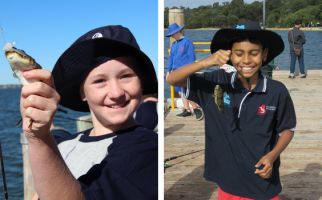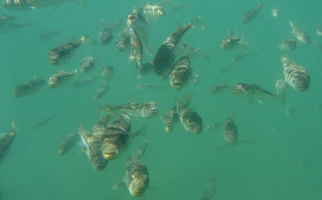Abundant throughout estuaries and coastal waters across the South-West of WA, blowfish or “blowies” are often regarded by anglers as a menace, with schools of blowies making quick work of baits and decreasing a fishers’ chances of catching other species.
We’ve all been there – the morse code taps on the line signaling the arrival of a school of these opportunistic feeders, quickly leading to a persistent feeding frenzy forcing anglers giving up on their fishing spots.
Then there’s the effort to remove hooks from their small mouths and buck teeth, with hooks commonly being bent or snapped by their strong jaws.
While blowies will never win a popularity contest, they play a crucial role as scavengers and keep marine and estuarine environments clean by eating up discarded scraps, burley and bait.
If you catch them you should treat them like any other unwanted fish and return them to the water quickly.
Leaving dead blowies lying around jetties, rock walls and river-banks is not only a bad look for our fishing community, they also pose a potential life-threatening hazard to people’s pet dogs if eaten.

The toxic traits of our spikey mates
Blowies’ bodies contain the lethal toxin called tetrodotoxin. This is the same toxin that is found in blue-ringed octopus bites. While it is safe to handle blowfish, eating them causes paralysis and this can be fatal for dogs if blowfish wash up or are discarded on our shoreline.
While fish such as tuna, tailor and mulloway can feed on blowfish without experiencing the ill-effects from their toxin, our furry companions are unable to do this.
If a dog is off the lead, they can quickly ingest a blowfish that has washed up on the shore before their owner realises what has happened. So, if you find a blowfish washed up on our shore, it is important to put it in the bin to keep it out of the path of dogs.
If your pooch does get one down, take the dog to a veterinarian immediately to induce vomiting and reduce the odds of the toxin being absorbed.

How to avoid blowies when fishing
Use bigger hooks and less burley. This decreases the chances of blowies being hooked due to their smaller mouths. If using burley, try using only a smaller amount as larger displacements mean more blowies will pick up the scent.
Move spots frequently. Blowies will often gather around popular fishing spots such as marinas, jetties and rock walls due to the presence of baits and scraps. If they are becoming more prevalent in your fishing spot, try your luck at another location.
Use lures, not bait. Blowies absolutely love chowing down on every kind of bait you can imagine. Anything from worms, prawns, mulies, and squid to real human food such as bread, corn and meats are on their menu. If you want to catch herring for example, try using small lures instead of bait.
Discard unused bait into bins. A smart way of keeping blowfish numbers down around your favourite fishing spot is by taking your unused bait home instead of throwing it into the water or disposing of it in a bin before you leave. Throwing bait in the water will attract more blowies and result in them congregating around that area.
